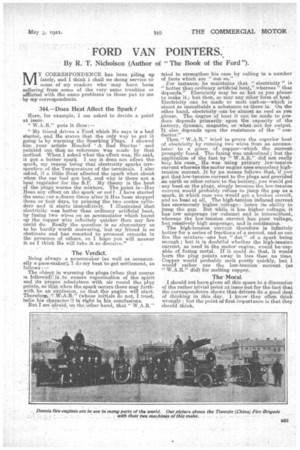FORD VAN POINTERS.,
Page 29

If you've noticed an error in this article please click here to report it so we can fix it.
By R. T. Nicholson (Author of "The Book of the Ford").
M Y CORRESPONDENCE has been piling up ' lately, and I thinki shall ne doing service to . some of my readers who may have been suffering from, some of the very same troubles or afflicted with ther same problems as those put to me by my correspondents.
344.—Does Heat Affect the Spark ?
Here, for example, I .am asked to decide a point
at issue. •
" W.A.R." puts it thus:—
" My friend drives a Ford which He says is a bad starter, and He states that the only way to get it going in by warming the Sparking Plugs. I showed him your article Headed 'A Bad Starter ' and pointed out that no reference was made by that method. When I asked what the effect was, He said, it got a better. spark I say it does, not affect the apark, my reason being that electricity sparks irrespective of the Temperature of the terminals. I also asked, if a little Heat affected the spark what about when the car had got hot, and why is there not a heat regulator for the &P. My theory is the heat oi the plugs warms the mixture. The point is—Has .Heat any effect on the spark or not? 1 have started the same car a. dozen times after it Has been stopped three or four days, by priming the two centre eylinder and it starts immediately. I illustrated that electricity was hotter than ordinary artificial heat, by fusing two wires on an accumulator which burnt up the copper wire infinitely quicker than any fire could do. Really the question is so elementary as to be hardly worth answering, but my friend is so obstinate and has resorted to personal remarks in the presence of others, so. I hope you will answer it as I think he will take it as decisive."
The Verdict.
Being always a peacemaker (as well as occasionally a pace-maker), I do my best to get settlement, as 'follows: - The object in warming the plugs (when that course
is followed) is ensure vaporization of the spirit and its proper admixture with air round the plug points', so that when the spark occurs there may forthwith be an explosion, so that the engine will start. Therefolg, `!" WiAllt." (whose initials do not, I trust, belie his' character ?) is right in his conelusions. But I ani-afraid, on the other hand, that" W.A.R."
tried to strengthen his ease by calling in a number of facts which are "not so."
For instance; he maintains that " electricity " is "hotter than ordinary artificial heat," whereas " that depends." Electricity may be as hot as you please to make it; but then, so may any other form of heat. Electricity can be made to melt carbon—which is about as unmeltable a substance as there is. On the other hand, electricity can be almost as cool as you please. The degree of heat it can be made to produce depends primarily upon the capacity of the .battery, dynamo, magneto, or what not for output. it. also depends upon the resistance of the "conductor."
Their." W.A.R." tried to prove the superior heat of electricity by running two wires from an accumulator to a piece of copper—which the current promptly fused. The fusing was undoubted ; but the application of the fact by " W.A.R." did not really help his ease. He was using primary low-tension current whereas the motor engine uses secondary hightension current. It by no means follows that, if you got that low-tension current to the plugs and provided an earth or other return to the battery, you would get / any heat'at the plugs, simply beca,rise the low-tension current would probably refuse to Jump the gap as a spark, in which ease you would get a. broken circuit, and no heat at all. The high-tension induced current has enormously higher voltage: hence its ability to jump the gap. But while it has higher voltage, it hap low amperage (or volume) and is intermittent, whereas the low-tension . current has poor, voltage, but relatively high amperage, and is continuous.
The high-tension current therefore is infinitely hotter for a series of fractions of a second, and so can fire the mixture—one hot " dot " of a spark being enough ; but. it is doubtful whether the high-tension current, as used in the motor engine,' would be' capable of fusing metal. If it could do that, it would burn the plug points away in less than no time. Copper would probably melt pretty quickly, but I would rather use the lo-tension current OA " W.A.R." did) for melting copper.
The Moral.
I should not have given all this space to a discussion of the rather trivial point at issue but for the fad that the correspondence shows that drivers do a good deal of thinking in this day: I know they often think wrongly ; but the point of first importance is that they should think,
































